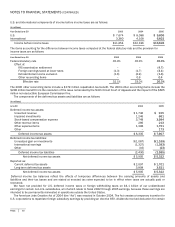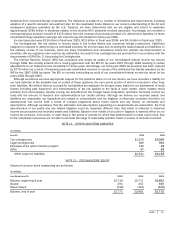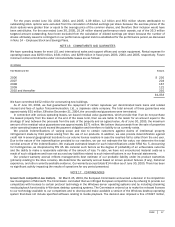Microsoft 2005 Annual Report Download - page 59
Download and view the complete annual report
Please find page 59 of the 2005 Microsoft annual report below. You can navigate through the pages in the report by either clicking on the pages listed below, or by using the keyword search tool below to find specific information within the annual report.
NOTES TO FINANCIAL STATEMENTS (CONTINUED)
PAGE 58
which resulted in a charge in the third quarter of fiscal year 2004 of €497 million ($605 million). We filed an appeal of the
decision to the Court of First Instance on June 6, 2004. On December 22, 2004, the Court ordered that we must comply with
the decision pending review on appeal and we are taking steps to ensure we are in compliance. The hearing date for the appeal
is expected to be determined later in calendar year 2005. We continue to contest the conclusion that European competition law
was infringed and will defend our position vigorously. The Korean Fair Trade Commission (KFTC) is investigating whether we
have violated Korean competition law by including Windows Media Player technologies in Windows, by including Windows
Messenger in Windows, or by distributing Windows Media Services as an optional component of Windows Server. Hearings on
this issue before the KFTC began on July 13, 2005, continued on August 23, 2005, and may be extended into the fall of 2005.
In other ongoing investigations, various foreign governments and several state Attorneys General have requested information
from us concerning competition, privacy, and security issues.
Antitrust, unfair competition, and overcharge class action lawsuits. A large number of antitrust and unfair competition class
action lawsuits have been filed against us in various state and federal courts on behalf of variously defined classes of direct and
indirect purchasers of our PC operating system and certain software applications products. The federal cases have been
consolidated in the U.S. District Court for Maryland. These cases allege that we competed unfairly and unlawfully monopolized
alleged markets for operating systems and certain software applications, and they seek to recover alleged overcharges for these
products. To date, courts have dismissed all claims for damages in cases brought against us by indirect purchasers under
federal law and in 17 states. Nine of those state court decisions have been affirmed on appeal. Appeals of one of those state
rulings is pending. There was no appeal in four states. Claims under federal law brought on behalf of foreign purchasers have
been dismissed by the U.S. District Court in Maryland as have all claims brought on behalf of consumers seeking injunctive
relief under federal law. The ruling on the injunctive relief and the ruling dismissing the federal claims of indirect purchasers are
currently on appeal to the United States Court of Appeals for the Fourth Circuit, as is a ruling denying certification of certain
proposed classes of U.S. direct purchasers. Courts in eleven states have ruled that indirect purchaser cases may proceed as
class actions, while courts in two states have denied class certification. In 2003, we reached an agreement with counsel for the
California plaintiffs to settle all claims in 27 consolidated cases in that state. Under the proposed settlement, class members
will be able to obtain vouchers that entitle the class members to be reimbursed up to the face value of their vouchers for
purchases of a wide variety of platform-neutral computer hardware and software. The total value of vouchers issued will depend
on the number of class members who make a claim and are issued vouchers. Two-thirds of the value of vouchers unissued or
unredeemed by class members will be made available to certain schools in California in the form of vouchers that also may be
redeemed for cash against purchases of a wide variety of platform-neutral computer hardware, software, and related services.
Since the beginning of 2003, we also reached similar agreements to settle all claims in a number of other states. The proposed
settlements in these states are structured similarly to the California settlement, except that, among other differences, one-half
of the value of vouchers unissued to class members will be made available to certain schools in the relevant states. The
maximum value of vouchers to be issued in these settlements, including the California settlement, is approximately $1.9 billion.
The actual costs of these settlements will be less than that maximum amount, depending on the number of class members and
schools who are issued and redeem vouchers. The settlements in Arizona, California, the District of Columbia, Florida, Kansas,
Massachusetts, Minnesota, Montana, New Mexico, North Carolina, North Dakota, South Dakota, Tennessee, Vermont and West
Virginia have received final court approval. The proposed settlement in Nebraska has received preliminary approval by the court
in those states, but still requires final approval. We estimate the total cost to resolve all of these cases will range between $1.2
billion and $1.5 billion, with the actual cost dependent upon many unknown factors such as the quantity and mix of products for
which claims will be made, the number of eligible class members who ultimately use the vouchers, the nature of hardware and
software that is acquired using the vouchers, and the cost of administering the claims process. In accordance with SFAS No. 5,
Accounting for Contingencies, and FASB Interpretation (FIN) 14, Reasonable Estimation of the Amount of a Loss, at June 30,
2005, we have recorded a liability related to these claims of approximately $1.1 billion, net of payments to date for
administrative expenses and legal fees.
Other antitrust litigation and claims. On August 27, 2004, the City and County of San Francisco, the City of Los Angeles, and
Los Angeles, San Mateo, Contra Costa and Santa Clara Counties filed a putative class action against us in San Francisco
Superior Court. The action was brought on behalf of all governmental entities, agencies and political subdivisions of the State of
California who indirectly purchased our operating system or word processing and spreadsheet software during the period from
February 18, 1995 to the date of trial in the action. The plaintiffs seek treble damages under California’s Cartwright Act and
disgorgement of unlawful profits under its Unfair Competition Act resulting from our alleged combinations to restrain trade, deny
competition, and monopolize the world markets for PC operating systems and word processing and spreadsheet applications
























